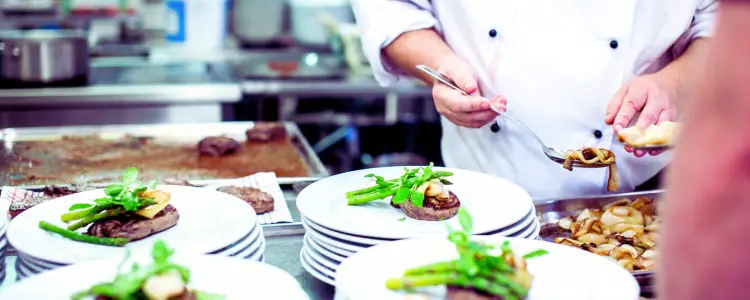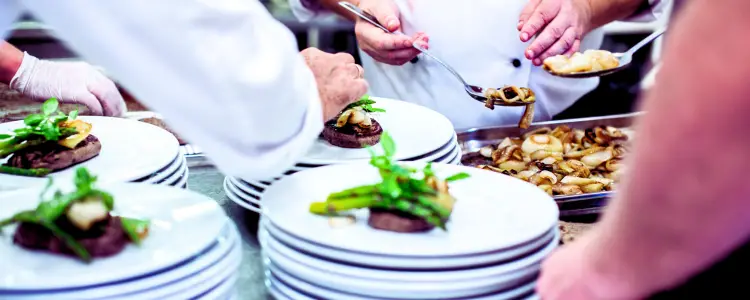In the hierarchy of a professional kitchen, a chef de partie is generally considered to be a mid-level position, above a commis chef but below a sous chef. The chef de partie is usually in charge of a specific section of the kitchen, such as the grill or sauté station, and is responsible for preparing and cooking the dishes that are assigned to their section.
The role of a chef de partie can vary depending on the size and type of restaurant they work in. In a smaller kitchen, a chef de partie may be responsible for managing their station independently, while in a larger kitchen, they may have one or more assistants working under them.
To become a chef de partie, an individual typically needs several years of experience working as a commis chef and a thorough understanding of the different sections of the kitchen. They should also have strong culinary skills, the ability to work well under pressure, and excellent time management skills.
In terms of career progression, a chef de partie may eventually move up to become a sous chef, who oversees the entire kitchen, or a head chef, who is responsible for the overall culinary vision of the restaurant. However, many chefs choose to specialize in a particular section of the kitchen and continue to work as a chef de partie for the duration of their careers.
Overall, the role of a chef de partie is crucial in a professional kitchen. They are responsible for ensuring that the dishes produced by their team are of the highest quality and that they are prepared in a timely and efficient manner.
Questions and answers:
Is a chef de partie higher than a chef in a kitchen?
In a professional kitchen, the organizational structure is designed to ensure that tasks are delegated and executed efficiently. The chef de partie and chef are two critical positions in the kitchen hierarchy.
The chef de partie, also known as a station chef, is responsible for overseeing a specific area or station in the kitchen, such as the grill, sauté, or pastry station. They are typically in charge of preparing and cooking dishes that fall within their designated station, ensuring that the food is prepared to the highest standard and meets the requirements of the head chef.
On the other hand, the chef is the overall head of the kitchen and is responsible for managing the entire kitchen team. The chef is responsible for menu planning, ordering ingredients, and ensuring that all dishes leaving the kitchen meet the restaurant’s standards. They are also responsible for managing the kitchen staff, including the chef de parties.
It is important to note that while the chef de partie is in a vital position in the kitchen hierarchy, they do not hold a higher rank than the chef. The chef de parties’ role is to assist the chef in executing their vision, ensuring that all dishes are prepared and cooked to perfection. However, the chef is ultimately responsible for the entire kitchen’s success, and their decisions hold greater weight in terms of the kitchen’s operations.
Great chefs knife

That being said, both positions require a high level of skill, experience, and dedication to their craft. A chef de partie must have a deep understanding of their designated station, be able to multitask and work well under pressure. The chef, on the other hand, must have excellent leadership and management skills, be able to make quick decisions, and possess a strong understanding of the culinary arts.
In conclusion, the chef de partie and chef are both critical positions in a professional kitchen and while the chef de partie is responsible for overseeing a specific station, the chef holds a higher rank and is ultimately responsible for the entire kitchen’s success.
How long does it take to become a chef de partie?
Becoming a chef de partie requires a significant amount of training, experience, and dedication to the culinary arts. The length of time it takes to become a chef de partie can vary depending on several factors, such as the individual’s prior experience, educational background, and level of commitment.
In general, most chefs de partie begin their culinary journey by attending a culinary school or apprenticeship program. These programs can range from a few months to several years, depending on the level of training and the institution’s requirements. A culinary program may cover topics such as food safety and sanitation, culinary techniques, and nutrition.
After completing a culinary program, aspiring chefs typically gain experience working in a professional kitchen. Entry-level positions such as a line cook or kitchen assistant can provide valuable hands-on experience and help develop the skills needed to become a chef de partie.
Once an individual has gained sufficient experience, they may apply for a position as a chef de partie. However, the amount of time it takes to reach this level can vary depending on the individual’s level of dedication, skill, and ambition.
In general, it can take anywhere from 5 to 10 years of training and experience to become a chef de partie. However, this timeline can be shortened if the individual is highly motivated and committed to their craft. Pursuing additional training and education, seeking out mentorship from experienced chefs, and constantly striving to improve one’s skills can help accelerate the path to becoming a chef de partie.
In conclusion, becoming a chef de partie is a long-term commitment that requires a combination of education, experience, and dedication to the culinary arts. While the timeline may vary depending on individual circumstances, the path typically involves several years of training and hands-on experience in a professional kitchen.

Some of my articles may contain affiliate links, which means I earn a small commission at no extra cost to you but it does help me with the running costs. As an Amazon Associate, I will earn commissions on purchases but this does not affect my reviews on products or services.
How many hours a week does a chef de partie work?
The working hours of a chef de partie can vary depending on the specific kitchen, the type of restaurant or establishment, and the chef de partie’s level of experience. Generally speaking, a chef de partie is expected to work long and irregular hours, including weekends, evenings, and holidays, in order to keep up with the demands of a busy kitchen.
In most kitchens, a chef de partie can expect to work anywhere from 40 to 60 hours per week. However, during busy periods such as holidays, special events, or high-volume service, the hours can exceed this range. In some cases, a chef de partie may be required to work up to 12 hours per day or more, depending on the kitchen’s needs.
It is important to note that the culinary industry is known for its demanding work schedules and long hours. While this can be challenging, it is also part of what makes the industry so rewarding for those who are passionate about food and cooking. Many chefs de partie thrive in fast-paced, high-pressure environments and find the work to be deeply satisfying and fulfilling.
That being said, some kitchens may offer more flexible working arrangements or alternative schedules to accommodate the needs of their employees. This may include rotating shifts, part-time work, or reduced hours during slower periods.
Great T.shirt

In conclusion, a chef de partie can expect to work between 40 to 60 hours per week, depending on the kitchen’s demands. However, during busy periods or special events, the hours can exceed this range. While the work can be demanding, it is also deeply rewarding for those who are passionate about the culinary arts.
How much can a chef de partie earn in a UK kitchen?
The salary of a chef de partie in the UK can vary depending on several factors, such as the location of the kitchen, the type of restaurant or establishment, and the chef de partie’s level of experience.
According to data from the Office for National Statistics, the average salary for a chef de partie in the UK is around £24,000 per year. However, salaries can range from £18,000 to £30,000 or more, depending on the factors mentioned above.
In addition to their base salary, many chefs de partie may also receive benefits such as health insurance, pension contributions, and paid time off. Some kitchens may also offer bonuses or performance-based incentives to encourage staff to perform at their best.
It is important to note that the culinary industry is known for its demanding work schedules and physically challenging work, which can contribute to higher rates of turnover and burnout. Many kitchens may offer additional benefits or perks, such as free meals or discounted gym memberships, to help mitigate some of these challenges and retain staff.
That being said, the salary of a chef de partie in the UK can be a competitive and rewarding career path for those who are passionate about the culinary arts. With dedication, hard work, and a commitment to continuous learning and improvement, a chef de partie can progress to more senior roles within the kitchen and increase their earning potential over time.
In conclusion, a chef de partie in a UK kitchen can expect to earn an average salary of around £24,000 per year, with the potential to earn more depending on their level of experience and the kitchen’s location and type of establishment. While the work can be physically demanding and challenging, it can also be deeply satisfying and rewarding for those who are passionate about the culinary arts.
Related posts:
- Crackling Pork: The Secret to a Delicious British Sunday Roast

- Discover 10 Favorite Ice Cream Flavors in the UK

- Chichester Canal Boat Ride: Discover the Tranquil Waterway



One thought on “What level is a chef de partie in a professional kitchen?”